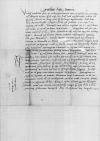 GStA, PK, HBA, H, K 760, No VI.11.18
GStA, PK, HBA, H, K 760, No VI.11.18
Numquam credebam fore, ut urbes Germanicae tam se exhiberent paratas ad obsequia ⌊caesaris⌋, quam se mihi suae maiestatis nomine exhibuerunt. Plura enim, quam petii, obtinui et longe plus, quam debuere, exhibuerunt, videlicet, cum ⌊Nurenbergenses⌋ obligati essent ad pedites 500, equites 58, misere ad mille; ⌊Ulmenses⌋, cum ad 300, equites 50 50 exhibuere ad mille et centum pedites lectissimos; ⌊Augustani⌋ ad 300, pedites miserunt mille. Idem fecerunt et alii, cuius rei ego sum oculatus testis.
Quod ad ⌊Turcas⌋ attinet, videtur refriguisse impetus ille per ⌊Danubium⌋. Scribit ⌊doctor Prantnerus⌋ ⌊eos⌋ converso itinere a ⌊Danubio⌋ in ⌊Stiriam⌋ profectos. ⌊Turcharum⌋ classis venit ⌊Methonem⌋ Peloponesi, nostra in ⌊Siciliam⌋ vicina ad loca, priorum dicitur esse triremium septuaginta biremium et myo ms. ra(!)
⌈oo ms. ra(!)
⌉paronum incerti numeri. Id autem pro certissimo habemus minime congressuros nobiscum ⌊Turchas⌋ mari. Quid terra facturi sunt, periculum faciemus!
Non credidissem tam feracem esse militis ⌊Germaniam⌋ et in hoc numero sunt longe plurimi veterani, omnes animati
cf. Gel. 9.11 et congrediuntur et consistunt, et conserebantur iam manus ⌊ad congrediendum et conserendas manuscf. Gel. 9.11 et congrediuntur et consistunt, et conserebantur iam manus ⌋. Munitionum bellicarum, bombardarum, pulveris et omnis apparatus plus habemus, quam ego arbitrabar, adeo permulcet animos ⌊Germanorum⌋ assensus ⌊caesaris⌋ in tranquillitatem imperii.
⌊Lutherani⌋ et id genus innovatorum incipiunt resipiscere. ⌊Zwingliani⌋ in
cf. De veritate q.12 a.12 ad 8 Ad octavum dicendum, quod signum, inquantum huiusmodi, est causa cognitionis; signatum vero est id quod est notum per aliud. Sicut autem nobilius cognoscitur id quod in se notum est et alia cognoscere facit, eo quod tantum in se notum est; ita etiam e contrario id quod notum est per se, non per aliud, nobilius cognoscitur quam quod per aliud notum est, sicut principia conclusionibus, et ideo e contrario se habet de signo et signato; unde ratio non sequitur ⌊signo et signatocf. De veritate q.12 a.12 ad 8 Ad octavum dicendum, quod signum, inquantum huiusmodi, est causa cognitionis; signatum vero est id quod est notum per aliud. Sicut autem nobilius cognoscitur id quod in se notum est et alia cognoscere facit, eo quod tantum in se notum est; ita etiam e contrario id quod notum est per se, non per aliud, nobilius cognoscitur quam quod per aliud notum est, sicut principia conclusionibus, et ideo e contrario se habet de signo et signato; unde ratio non sequitur ⌋,[1] ut vocant, convenere cum ⌊Luteranis⌋, et de sacramento verbo non est ambiguitas, quid in corde sit, nescio. Omnes sumus in apparatu bellico, forte si visum fuerit ⌊caesari⌋ non sequi ⌊Turcam⌋, quod nos remur excursionibus magis quam iusto bello usurum, poterimus hibernare ⌊Neapoli⌋.
 GStA, PK, HBA, H, K 760, No VI.11.18
GStA, PK, HBA, H, K 760, No VI.11.18
